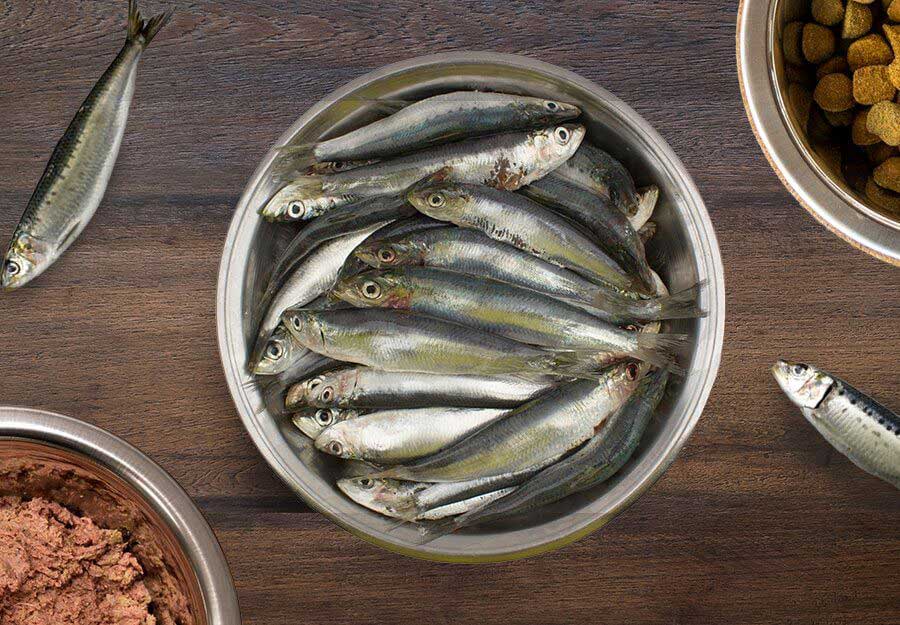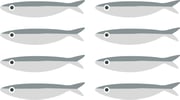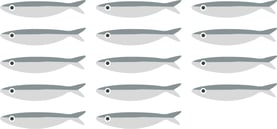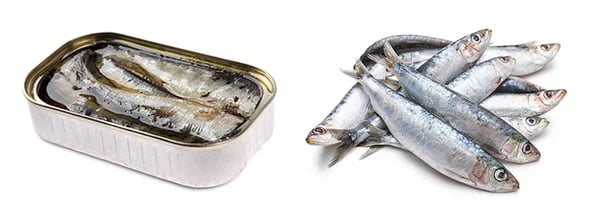
We love to share our food with our pets, but it’s not always easy to know which foods are safe, and even more, which foods are actually good for them. From an allergic reaction to blood glucose levels, pet owners must use their discretion before offering various treats for dogs. Sardines might not be the first food that comes to mind when you think about treating yourself, but they are good for you. So what about your dog? Can dogs eat sardines?
Are sardines good for dogs? Can Dogs Eat Sardines? Yes! Sardines for dogs are actually one of the best types of fatty fish to share with your dog. Not only are sardines safe, but they are also a good source of many essential nutrients.
If you are looking for a delicious way to improve your dog’s health, then stick around to find out just how good these little oily fish are for your furry friend.
Can Dogs Eat Sardines?
Sardines for dogs are great, but like any food, always in moderation.
The more we learn about our pets, the more we realize that food has some pretty amazing healing powers. Your dog’s diet should at least cover their basic needs, but many foods can be used supplementally to provide your dog sardines with any additional nutrients they might need.
5 Great Reasons to Feed Your Dog Sardines
Adding sardines to your dog’s diet can offer many health benefits. Let’s take a look at the nutrients your dog can get from sardines and how they can positively impact their health.
1. Skin and Coat Health
![]()
You’ve probably heard of the skin and coat benefits of omega-3 fatty acids. Sardines supply a good source of omega-3 fatty acids that can help reduce inflammation of your dog’s skin and coat and minimize itchiness and hot spots associated with allergies and seasonal changes.
2. Mobility
![]()
Hip and joint issues can limit movement and cause persistent pain for many large breeds and older pets. Feeding sardines can reduce the inflammation in the joints that can cause pain. They also offer moderate levels of calcium and phosphorus, two minerals needed to support your dog’s skeletal structure.
3. Cognitive and Retinal Function
![]()
One of the omega-3 fatty acids in sardines is DHA. This fatty acid is vital to cognitive function and eye health. DHA is a required nutrient for all dogs but especially important for puppies and seniors. Supplementing your dog’s diet with DHA will support growth and minimize the signs of ageing.
4. Heart Health
![]()
Another vital nutrient in sardines is Ubiquinol (or coenzyme10). This antioxidant is present in many cells in your dog’s body, but boosting these levels can help to support your dog’s heart function. This is especially helpful in pets that have an existing congenital issue.
5. Total Body Health
![]()
Sardines are a complete protein source, meaning they contain all of the essential amino acids that your dog’s body needs to be healthy. These nutrients support all functions of your dog’s body, including digestion and organ function.
The Mercury Myth
Fish and larger fish oils have been garnering some controversy over the years due to concerns about mercury toxicity. So, is your pet at risk of mercury toxicity from feeding sardines safe for dogs?
The fact is mercury is in our oceans, and it absorbs into every living organism that either lives or eats something that lives in the ocean. From the smallest plankton to the largest predator in the ocean, mercury accumulates in their bodies.
Dried sardines for dogs actually have a very low mercury content compared to most larger fish, but as we go up the food chain, mercury accumulates in higher and higher concentrations. Larger fish like salmon and king mackerel will have a much higher mercury content than small fish like sardines and anchovies.
This doesn’t completely eliminate the risk. Over time, the trace amounts of mercury in sardines can begin to accumulate in your pet, so it’s important to limit how much fish and larger fish oils you add to your dog's diet.
They should be used supplementally and in small portions. This will allow your pet’s body time to eliminate mercury through their urine and waste.
How to Feed Sardines to Your Dog
Sardines are both calorie and nutrient-dense, so a little goes a long way. Just one small sardine can contain up to 25 calories, approximately half from fat and half from protein sources.
Feeding too many dog sardines can lead to weight gain and digestive issues. They are rich, so make sure you feed sardines appropriately and account for these extra calories in your pet’s regular feeding guidelines.
Dosage isn’t an exact science because every pet is different and has different needs, but we found some helpful guidelines from the Whole Dog Journal that can help you get started. The guideline below is based on weekly feeding your dog. We don't recommend feeding this many sardines in one day or meal, so try to break up the quantities throughout the week.
Feeding Guidelines
| Weight | Feeding Amount |
| <5 lbs |
or 1/4 can |
| 6-15 lbs | 
or 1/2 can |
| 16-25 lbs |  or 5/8 can |
| 26-50 lbs | 
or 1 can |
| 51+ lbs | 
or 1 3/4 can |
We always recommend slowly introducing new foods in smaller portions to allow your dog to adjust. Start with small bite-sized portions and slowly work your way up to the whole fish.
Canned vs Fresh

Can Dogs Eat Sardines? We know that fresh foods always offer a good source of nutrients, but fresh sardines aren’t always the most widely available or cost-effective option. So, you may opt for canned sardines instead.
Canned sardines are still packed with tons of nutrients, but not all canned sardines are suitable. Make sure you read the label and check for some of these no-no options, like salt, artificial flavours, spices, or dog sardines packed in oil.
Salt and flavours might seem obvious, but what about oils? Plant-based oils are often used in canned sardines.
Most plant oils are typically safe and nutritious for dogs, but they could provide too many Omega 6 fatty acids contributing to inflammation. It's best to avoid these oils, especially if your dog is already getting an ample supply of omega-6 fatty acids in its regular dog's diet.
It’s best to keep it as natural as possible and look for sardines with no additives that are packed in water for safety and weight management.
If you can source fresh sardines for dogs, keep in mind that they might be larger than the canned ones. This increases the calories but can also harbour some large backbones. It’s best to remove the backbone of large sardines to prevent choking risks.
Sardines can be offered raw or cooked. If you are a raw feeder already, then offering your dog raw fish won’t be a problem. Cooked sardines are healthy too, but it’s best to gently steam them to retain as many nutrients as possible.
Tips for Adding Sardines to Your Dog Diet
Are you ready to start adding sardines to your dog’s diet? Let’s look at some of the easiest ways to feed sardines, whether they are freeze-dried or canned.
- Feeding bite-sized sardines fresh and whole is great if you want to give your dog something to chew on for a few minutes. Remember that you might need to remove the backbone before feeding.
- Spice up your dog’s meals by adding chopped-up sardines or water from a can of sardines. This will add both moisture and nutrition, too.
- Add sardines to your favourite homemade dog treats recipe. They can make for a high-value treat for training and reward. Furthermore, many of these homemade dog treats are great treats for diabetic dogs. It is additionally easy to create grain-free, low-calorie dog snacks.
- If your goal is to add omega-3 fatty acids to your dog’s diet, then sardine oil might be the best option.
Sardines might not be your favourite snack, but it’s a delicacy for dogs. They are even great for cats too. Add a little to everyone’s meals to boost their health and spice up their routine.
We promise they will love these treats more than green beans or other fruits and vegetables while benefiting from nutrients similar to those found in sweet potatoes, chicken breast, green beans, and more.
Of course, be certain you're not dealing with dogs with allergies before feeding them anything new.
Frequently Asked Questions
Can dogs eat sardines?
Yes, dogs can eat sardines. Sardines are a good source of omega-3 fatty acids, protein, and other nutrients that are beneficial for dogs when included in their diet in moderation.
Are there any benefits to feeding sardines to dogs?
Feeding sardines to dogs can provide omega-3 fatty acids that support healthy skin, coat, and joint health. They also offer protein, calcium, and other essential nutrients.
Should I feed sardines packed in water or oil to my dog?
Feeding your dog sardines packed in water is generally better, as oil-packed sardines can be high in fat and calories. Choose varieties without added salt or additional seasoning.
How often can I give my dog sardines?
Sardines can be given to your dog as an occasional treat or as part of their regular diet, depending on their size and nutritional needs.
Can feeding sardines cause any problems for dogs?
While sardines are generally safe, be cautious about bones. Sardines typically have soft, digestible bones, but if you're concerned, you can choose boneless varieties or remove the bones before feeding.
How should I prepare sardines for my dog?
You can offer your dog sardines fresh, cooked, or canned.
.png?width=200&height=66&name=logo%20(1).png)



.jpg)

